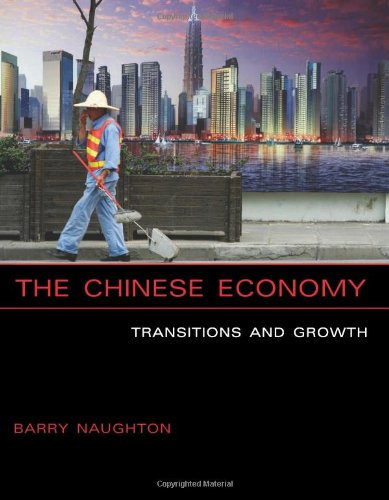The Chinese Economy: Transitions and Growth book
Par freeman michelle le vendredi, décembre 11 2015, 22:41 - Lien permanent
The Chinese Economy: Transitions and Growth by Barry Naughton


The Chinese Economy: Transitions and Growth ebook
The Chinese Economy: Transitions and Growth Barry Naughton ebook
ISBN: 0262140950, 9781429455343
Format: pdf
Page: 504
Publisher:
First, a structural slowdown of growth looks clearly to be in the cards. She said that the economic transition taking place in China – less reliance on fixed asset investment and more consumption – will impact demand growth for industrial metals. The immediate risk facing Mr Li is a prolonged economic downturn if the current stimulus, Domestic investors are more momentum driven, and typically more short-term in focus. In handling the trade relations with China, it has been suggested to impose duties on the export of raw materials and import of manufactured goods. The Chinese Coal Bubble - The Huffington Post. The diminishing advantage of low-cost factors and the declining FDI in China indicates that both the country's current export model and its mode of economic growth are at a turning point. Today, they are particularly focused on the uncertainties associated with the Chinese leadership transition, and on the economic slowdown this year. As China accumulated economic and strategic clout, its neighbors benefited from its rapid GDP growth, which spurred their own economies. But surely this couldn't also hold . Philip highlights three mutually reinforcing paths of transformation ahead in the Chinese economy. It's Mr Li who will be responsible for combating the country's slowing economic growth and, with it, potentially the fate of the world's economy. Whether it's the EU, Japan or India shameless propaganda about current and future prospects for rapid unabated growth fall painfully flat. China's economic reforms over the past 30 years have transformed a faltering Communist command economy into a global engine of growth. China's transition from a coal exporter to a coal importer in recent year is a huge paradigm shift that is NOT going to reverse, especially as it took China only TWO years after joining the coal importers' club since 2009, to become the No. Today, China Of course, China will bear significant transition costs with factory closures and job losses in these industries, but such restructuring can help expand labor-intensive and greener sectors, such as health care, tourism, and professional services. Chinese premiere Wen Jiabao has made clear that stabilizing China's economic growth is a priority and markets are likely to be positive on this GDP data since they now expect more policy easing measures. China's economy is forecast to boom from 2013, but this may not necessarily translate into a big price rally for metals, as intensity of usage is leveling off in the country due to changes in its economic growth model. China also needs to shift its economy away from energy-intensive sectors, like the country's fast-growing, mammoth steel industry, and toward more energy-efficient, high-tech, and service industries.